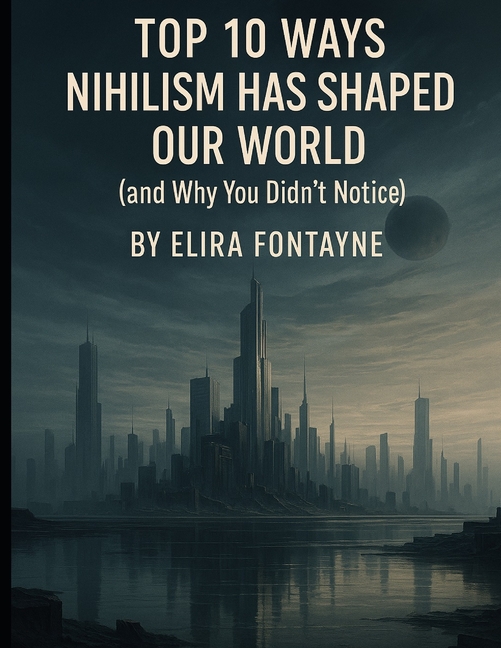Description
What if the most powerful force shaping the modern world was... nothing?
We live in an age of deep uncertainty. Institutions are questioned, truths are fractured, and the search for meaning often feels more like a personal burden than a cultural inheritance. Yet few realise just how much of our present-day worldview is quietly shaped by a radical idea: nihilism-the belief that there is no inherent meaning, purpose, or absolute truth.
In Top 10 Ways Nihilism Has Shaped Our World (and Why You Didn't Notice), Elira Fontayne takes readers on a compelling journey through ten unexpected yet powerful ways that nihilistic thought has seeped into the fabric of everyday life. From the fractured narratives of postmodern literature to the existential disillusionment embedded in our favourite TV shows, from meme culture and ironic humour to the rejection of grand narratives in science and politics-this book uncovers how a philosophy often dismissed as bleak or extreme has, in fact, quietly rewritten the script of our age.
This is not a philosophy textbook, nor is it a lament for lost certainty. Rather, it is a provocative cultural exploration that peels back the surface of modern life and reveals the hidden architecture beneath. In a world that often feels chaotic, absurd, or disjointed, Fontayne invites us to consider that these feelings are not signs of collapse-but evidence of transformation.
Inside, you'll discover:
How absurdist theatre and post-war literature gave voice to the anxiety of meaninglessness
Why existentialism and nihilism are intellectual siblings, not enemies
The surprising influence of nihilism on comedy, satire, and dark humour
How scientific advances stripped away old certainties and opened new philosophical voids
Why pop culture, music, and visual art often carry nihilistic undercurrents-even when we're not aware of them
How modern scepticism, distrust of media, and digital irony all echo nihilistic thought
And ultimately, how the absence of objective meaning might be the very catalyst for radical reinvention
Fontayne's writing is sharp, insightful, and infused with empathy. She doesn't glorify nihilism, but neither does she vilify it. Instead, she treats it as what it is: a cultural current that has shaped our age far more than most people realise. And she shows that, rather than plunging us into despair, nihilism can awaken us to a deeper creative freedom-the power to author our own meanings, values, and truths.
If you've ever wondered why so much of modern life feels unmoored, why irony dominates the internet, or why even the most confident ideologies seem riddled with cracks-this book is your answer. It's an invitation to look beneath the surface and recognise the silent, often unacknowledged force that continues to shape our stories, our institutions, and our inner lives.
This is the age of "nothing." But in that void, we might find the space to build something truly new.
Product Details
- Jul 8, 2025 Pub Date:
- 9798291676714 ISBN-10:
- 9798291676714 ISBN-13:
- English Language




